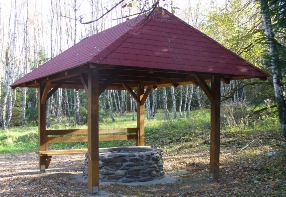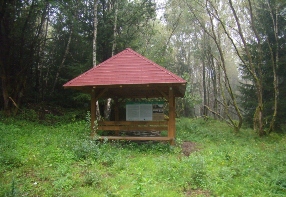Zadní Chalupy
Former village of Zadní Chalupy lies on the northern slope of Ostrý mountain, close to the spring of the Chodská Úhlava river.
Just a few documents about the village have been preserved to date. The first written record about the extinct village dates back to 1701, when it was mentioned in the relevant land register of the estates of Bystřice nad Úhlavou. According to the Land-Registry of Maria-Theresa from 1757 the village allegedly had 12 houses. The same number was mentioned in 1789. According to the description of the Kingdom of Bohemia from 1854 the cadastral village of Zadní Chalupy was settled by 234 inhabitants in 1854 and belonged to the parish of Nýrsko under the jurisdiction of Nýrsko judicial district, falling politically under the district of Klatovy. An ungraded school was established here in 1878. According to the population census of 1890, 167 people were living in 30 houses, in 1930 150 people were living permanently in the village of whom 140 were Germans in 29 houses. The last records from 1939 document 140 people living in the village, which ceased to exist after the World War II.
A preserved report by the commander of the police station in Zelená Lhota, Sergeant Grossle, from 18th September 1948 says that the village of Zadní Chalupy lies in close vicinity of the country border, is not suitable for settlement and all the family houses, stables and sheds are outworn and therefore should be demolished out of safety reasons. Further on, the report says that the village of Zadní Chalupy has 30 land-registry numbers in total, of which only the former František Bredl's local pub No. 3 is completely new, bricked, spacious and in good condition and could therefore be well used for recreational purposes. The same goes for the buildings of former German school No. 28. The forest roads at the territory of Zadní Chalupy are nevertheless in such unfavourable condition that they cannot be used nor even for horse carriage drive.
The buildings of the financial guard No. 23 and school No. 28 were handed over to the army as suitable for demolition and exploitation of construction material in 1950. In the following period the village territory was included into the border region with restricted entry due to the protection of the country borderline. This resulted in disappearance of the village, which has not revived but after 1990.
Today, the area is a part of the natural monument Královský hvozd, which is subject to the Nature Protection Act. It is a tourist destination connecting the Czech and Bavarian border regions by the tourist frontier crossing point Zadní Chalupy - Helmhof.
One of the village estates is a native house of the Šumava German author Anton Schott, who was born here as a son of a poor weaver and smallholder on 8th February 1866. As there was not a school in the village, he learned to read and write from his father. After 1878, when an ungraded school was established in Zadní Chalupy, Schott started to attend it and acquired here his first school knowledge. Though his father was only a weaver, he was receiving respect from everybody from the village. In 1879 Schott started to study at the technical secondary school in Pilsen but had to interrupt his studies due to lack of financial means. At the age of fifteen he started to work as a copy clerk with the office of the attorney Dr. Renner in Nýrsko. The talented young man nevertheless eventually graduated from the German collage of education in Prague thanks to his sedulous self-studies and in the period between 1883 and 1895 worked as a teacher in the village of Červené Dřevo. In this period he also published his first short stories. In 1902, Schott won a prize for his novel called "Gottesthal" (The God's Valley), stopped teaching, bought the ancient barracks of the financial guard in Zadní Chalupy and started farming. He attended to botanical studies and took such interest in public matters that he was elected mayor of the village. When his children grew up he sold the farm in 1918 and moved to Austria. Over his life he published some fifty books and thirty collections of short stories and novels. In his novel "Der letzte Richter" (The Last Magistrate) he described expiry of privileges of the inhabitants of Královský hvozd, the free border guards called Králováci, in the period between 1847 and 1848. In his books the author celebrated the beauties of the Šumava land and strength of local farmers. He died in 79 years of age on 4th April 1945 at his farm Hueb in Mettmach, Upper Austria. After his death an extensive work called "Einer der Stillen im Lande" (One of the Silent in the Country) was published. Anton Schott is a granduncle of the German prose-writer also describing the Šumava themes Josef Holub, the native of Nýrsko and author of the novel "Der rote Nepomuk".
Just a few documents about the village have been preserved to date. The first written record about the extinct village dates back to 1701, when it was mentioned in the relevant land register of the estates of Bystřice nad Úhlavou. According to the Land-Registry of Maria-Theresa from 1757 the village allegedly had 12 houses. The same number was mentioned in 1789. According to the description of the Kingdom of Bohemia from 1854 the cadastral village of Zadní Chalupy was settled by 234 inhabitants in 1854 and belonged to the parish of Nýrsko under the jurisdiction of Nýrsko judicial district, falling politically under the district of Klatovy. An ungraded school was established here in 1878. According to the population census of 1890, 167 people were living in 30 houses, in 1930 150 people were living permanently in the village of whom 140 were Germans in 29 houses. The last records from 1939 document 140 people living in the village, which ceased to exist after the World War II.
A preserved report by the commander of the police station in Zelená Lhota, Sergeant Grossle, from 18th September 1948 says that the village of Zadní Chalupy lies in close vicinity of the country border, is not suitable for settlement and all the family houses, stables and sheds are outworn and therefore should be demolished out of safety reasons. Further on, the report says that the village of Zadní Chalupy has 30 land-registry numbers in total, of which only the former František Bredl's local pub No. 3 is completely new, bricked, spacious and in good condition and could therefore be well used for recreational purposes. The same goes for the buildings of former German school No. 28. The forest roads at the territory of Zadní Chalupy are nevertheless in such unfavourable condition that they cannot be used nor even for horse carriage drive.
The buildings of the financial guard No. 23 and school No. 28 were handed over to the army as suitable for demolition and exploitation of construction material in 1950. In the following period the village territory was included into the border region with restricted entry due to the protection of the country borderline. This resulted in disappearance of the village, which has not revived but after 1990.
Today, the area is a part of the natural monument Královský hvozd, which is subject to the Nature Protection Act. It is a tourist destination connecting the Czech and Bavarian border regions by the tourist frontier crossing point Zadní Chalupy - Helmhof.
One of the village estates is a native house of the Šumava German author Anton Schott, who was born here as a son of a poor weaver and smallholder on 8th February 1866. As there was not a school in the village, he learned to read and write from his father. After 1878, when an ungraded school was established in Zadní Chalupy, Schott started to attend it and acquired here his first school knowledge. Though his father was only a weaver, he was receiving respect from everybody from the village. In 1879 Schott started to study at the technical secondary school in Pilsen but had to interrupt his studies due to lack of financial means. At the age of fifteen he started to work as a copy clerk with the office of the attorney Dr. Renner in Nýrsko. The talented young man nevertheless eventually graduated from the German collage of education in Prague thanks to his sedulous self-studies and in the period between 1883 and 1895 worked as a teacher in the village of Červené Dřevo. In this period he also published his first short stories. In 1902, Schott won a prize for his novel called "Gottesthal" (The God's Valley), stopped teaching, bought the ancient barracks of the financial guard in Zadní Chalupy and started farming. He attended to botanical studies and took such interest in public matters that he was elected mayor of the village. When his children grew up he sold the farm in 1918 and moved to Austria. Over his life he published some fifty books and thirty collections of short stories and novels. In his novel "Der letzte Richter" (The Last Magistrate) he described expiry of privileges of the inhabitants of Královský hvozd, the free border guards called Králováci, in the period between 1847 and 1848. In his books the author celebrated the beauties of the Šumava land and strength of local farmers. He died in 79 years of age on 4th April 1945 at his farm Hueb in Mettmach, Upper Austria. After his death an extensive work called "Einer der Stillen im Lande" (One of the Silent in the Country) was published. Anton Schott is a granduncle of the German prose-writer also describing the Šumava themes Josef Holub, the native of Nýrsko and author of the novel "Der rote Nepomuk".


